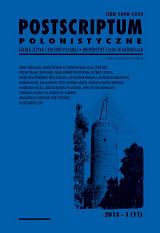Wystąpienia: Humanizm europejski a świadomość narodowa. Przemyślenia literaturoznawcy
Addresses: European Humanism and National Consciousness. Thoughts of a Literary Critic
Author(s): Rolf FieguthSubject(s): Language and Literature Studies
Published by: Wydawnictwo Uniwersytetu Śląskiego
Keywords: European Humanism; national consciousness; imagined communities; Latin and vernacular languages; humanist historiography
Summary/Abstract: Thinking in national categories is rooted in man’s and woman’s nature as a „communitarian animal“ who is permanently producing collective community imaginations. It can be found a long time before the French Revolution and acquires astonishing strength in the 15th and 16th Centuries, implying denomination quarrels and linguistic questions (Latin and vernacular). Italian humanist writings challenge colleagues in Germany and Poland to develop their own nation centred programmes of historiography, in which Tacit’s "Germania" and Miechovita’s "Sarmatia" constitute analogous points of reference (H.-J. Bömelburg). The evident arbitrariness inherent to some of these nation centred writings reflects the principally imaginary or „intentional“ (Ingarden) character of any communitarian consciousness. This does however not diminish the real historical impact of national consciousness, nor the importance of the cultural and moral universe connected with it – despite the crisis of traditional authorities, hierarchies and values we have to deal with in actual Europe and the world.
Journal: Postscriptum Polonistyczne
- Issue Year: 11/2013
- Issue No: 1
- Page Range: 19-28
- Page Count: 10
- Language: Polish

